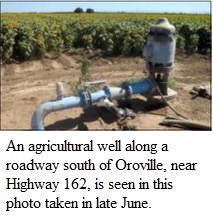Locals will be required to manage groundwater, and if not the state steps in
By Heather Hacking, Chico Enterprise-Record
hhacking@chicoer.com @HeatherHacking on Twitter
8.30.14: SACRAMENTO >> The wild west of groundwater law is about to change in California.
Friday the Legislature passed AB1739, which works with SB1168 to begin groundwater management. The goal is for statewide sustainable groundwater use within 20 years, balancing economic, social and environmental benefits.
 “We will probably see nothing bigger in our lifetime for changes to water law,” said Paul Gosselin, director of the Butte County Department of Water and Resource Management.
“We will probably see nothing bigger in our lifetime for changes to water law,” said Paul Gosselin, director of the Butte County Department of Water and Resource Management.
The laws allow for local control. Yet, the big change is that the state can step in if local groundwater management isn’t working, or if the state determines local groundwater management isn’t working.
For Butte County, a sustainability plan needs to be in place by 2022. Areas elsewhere with critical overdraft will need a plan two years earlier.
The earliest deadline is two years from now, when each sub- basin identified by the state needs to declare who will run the groundwater plans.
Currently groundwater is not regulated on a statewide basis. Generally, property owners have a right to pump groundwater for beneficial use.
In some areas of the state, groundwater levels have dropped over the past many decades, long before the current drought.
Depleted groundwater can lead to land subsidence, where the soil loses its ability to store water in the future. Subsidence can also harm infrastructure such as roads, canals and established structures.
Currently, local monitoring is done for land subsidence, and none has been detected.
The devastating drought the past three years has brought groundwater use to the forefront, as cities and farms are pumping groundwater at high rates when surface water supplies have been cut dramatically.
AB1739 author Assemblyman Roger Dickinson, D Sacramento, speaking before the vote Friday, said all legislators know groundwater is being over- drafted. “The question is not what happens if we act. The question is what are the consequences if we fail to act.”
Gosselin said the county already has much of the work done to fulfill the state’s request for a management plan. Plus, individual water districts have their own groundwater management plans. Within two years, locals will decide who will submit plans to the state to meet the new requirements.
“Most of it is no different than what we are working on now,” Gosselin said.
However, “there is a whole set of issues,” including reporting to the state and whether the state thinks the local plans are good enough.
One unresolved concern, Gosselin said, is that the state could step in if there is stream depletion linked to groundwater pumping.
Thad Bettner, manager of Glenn-Colusa Irrigation District, agreed. Stream depletion could be interpreted broadly. Also there is distrust as to what the state might do in the future with these rules on the books.
“Given the history of the state (Water Resources Control Board), there’s distrust that the board will act prematurely” and step in without giving locals a chance to fix problems, Bettner said.
“This bill recognizes existing water rights, period, end of discussion,” Dickinson said Friday before the assembly vote.
“This bill is built on local control,” he continued.
However, Bettner said water leaders have seen “again and again where the state board has threatened to step in and not let us” manage locally.
The biggest change is the unknowns, Gosselin concurred. What’s also new is the state having the ability to step in if local plans aren’t accepted.
At the very least, local water leaders will need to conform with the yet-to-be determined state guidelines.
The state also isn’t offering to fund the local plans, Bettner said, which means locals would pick up the costs.
The package of bills allows local agencies to assess fees for groundwater management.
Gosselin said he believes the work can be done without new fees. However he doesn’t know what the rules will be and how much work they will include.
“Are they going to be reasonable and flexible or are they going to want things unnecessary and costly?” Gosselin said.
“This will be a huge change in water management unlike anything that has happened before,” Gosselin concluded. “The future will be different.”
Local votes
Assemblyman Dan Logue, R-Loma Rica, and state Senator Jim Nielsen, R- Gerber, both voted against the bills.
Logue, reached after the vote, said he considers the rules a “ taking of water rights.”
Butte County is managing its groundwater, Logue said.
“Why go into Butte County and put criteria on them … to set up these agencies where they are not needed?”
Some areas of the state, including Tulare County, do have serious groundwater depletion problems, Logue said. That’s where the focus should be, not statewide.
The assemblyman said he’s also worried the rules will add costs for groundwater users. Sen. Nielsen also stated strong concerns in a press release.
“Newly created and existing government agencies will be granted enforcement powers to inspect, with or without landowners’ consent, the property or pump to ensure compliance. If the State Water Resources Control Board deems that local agencies failed to comply and/ or enforce restrictive regulations, then the state intervenes with its excessive powers to impose fees and fines.”
Contact reporter Heather Hacking at 896-7758.